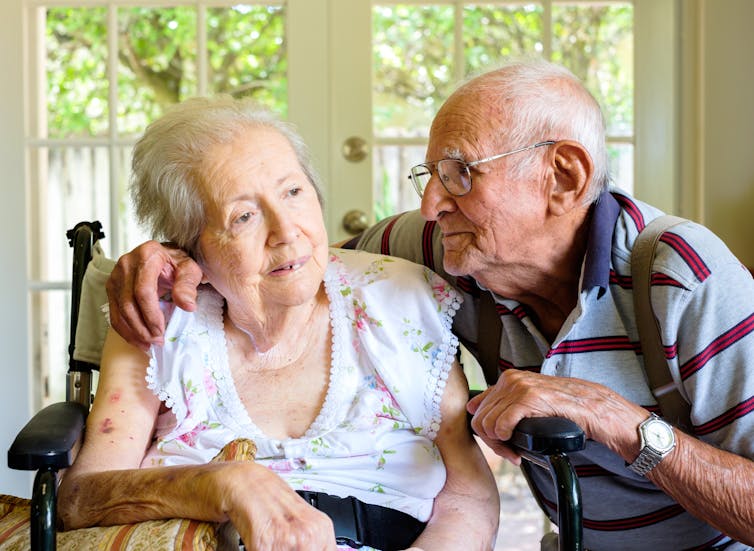Literature Review of the End-of-life-care of the Oldest Old
This is ane of ii final articles in our Coping with Mortality series. Today's accompanying piece explains the importance of effectively using palliative care services. You tin read previous articles in our series here.
Across the developed world more people are living longer, which of course means more become to be extremely quondam past the time they dice. Nearly half of all deaths in the U.k. are in people aged 85 or older, up from merely one in five simply 25 years ago.
Dying in older age tin can hateful a unlike sort of death, such as becoming gradually frailer in both torso and heed and developing numerous health bug over many years. Where years afterward retirement were previously considered just old historic period, a longer life span means the later years at present include variation reflected in labels such as younger old and older one-time.
Our previous research showed people who are over xc when they dice demand more support with daily life in their last twelvemonth than even those who dice in their late 80s. In the United Kingdom, effectually 85% of those dying aged 90 or older were then disabled every bit to need help in basic self care activities. Just 59% of those between 85 and 89 at death had this level of inability.
This noesis has implications for planning back up for life and death in different care settings. But what do nosotros know about what the older old (95 plus) people actually desire when it comes to decisions about their intendance every bit they approach the end of their lives?

How the older erstwhile feel about dying
The oldest and frailest in our society are becoming less visible as many who demand the most support, such as those with dementia, are either in intendance homes or less able to get out and almost. But their voices are crucial to shaping end-of-life care services.
In our latest inquiry, we had conversations most care experiences and preferences with 33 women and men anile at least 95, some over 100, and 39 of their relatives or carers. Of these, 88% were women, 86% were widowed and 42% lived in care homes.
Decease was part of life for many of the older people who oftentimes said they were taking each 24-hour interval as information technology comes and non worrying too much about tomorrow. "Information technology is only 24-hour interval-from-twenty-four hours when you get to 97," said one adult female. Most felt ready to dice and some even welcomed information technology: "I but say I'grand the lady-in-waiting, waiting to go," said one.
Others were more drastic in their desire to reach the end. "I wish I could snuff it. I'm only in the way," was a typical sentiment in those who felt they were a nuisance. Others begged not to be left to live until they were a hundred, saying there was no bespeak to keeping them alive.
Most were concerned almost the touch on on those left backside: "The only affair I'm worried near is my sister. I hope that she'll exist non sorry and be able to come to terms with it."
The dying process itself was the cause of most worries. A peaceful and painless decease, preferably during sleep, was a mutual platonic. Interviewees mainly preferred to be made comfortable rather than have treatment, wishing to avoid going into hospital.
We found families' understanding of their relative's preferences only occasionally incorrect (merely twice). For example, one person said they wanted to have treatment for as long every bit they could, while their family member believed they would adopt palliative care. This highlights the importance of trying to talk options through with the older person rather than assuming their family unit knows their views.
We found most discussed end-of-life preferences willingly and many mentioned previous talk about death was uncommon, frequently just alluded to or couched in humour. A minority weren't interested in these discussions.

We need to talk with the older old
Information technology's rare to hear from people in their tenth or eleventh decade but at that place are some studies that have explored the views of the younger one-time. Most often these have concentrated on care dwelling residents and occasionally on those living at home.
A literature review conducted in Sweden in 2013 found a total of 33 studies across the world that explored views of decease and dying among older people, although very few of these sought the views of the older old.
A 2002 study plant older people in Ghana looked forward to decease, seeing information technology every bit a welcome visitor that would bring peace and remainder later a strenuous life. And a 2013 study in kingdom of the netherlands showed many people changed their preferences on how they wanted to die as their care needs changed.
A recent review examined older people's attitudes towards advance care plans and preferences for when to start such discussions. Information technology identified 24 studies, mainly from the United States and with younger erstwhile age ranges. The results showed that while a minority shirked from finish-of-life care give-and-take, most would welcome them but were rarely given the opportunity.
These studies support our findings on older people'south willingness to discuss often taboo topics, their acceptance of impending decease, and their concerns around what the dying procedure would bring: increasing dependence, being a brunt and the impact of their own death on those left behind.
To programme services to all-time support ascent numbers of people dying at increasingly older ages in unlike settings, we need to understand their priorities as they well-nigh the stop of life.
Source: https://theconversation.com/heres-what-people-in-their-90s-really-think-about-death-58053